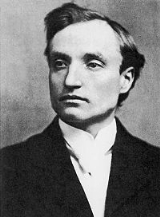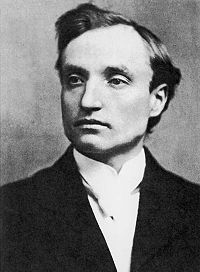
Ben Tillett
Encyclopedia

United Kingdom
The United Kingdom of Great Britain and Northern IrelandIn the United Kingdom and Dependencies, other languages have been officially recognised as legitimate autochthonous languages under the European Charter for Regional or Minority Languages...
socialist
Socialism
Socialism is an economic system characterized by social ownership of the means of production and cooperative management of the economy; or a political philosophy advocating such a system. "Social ownership" may refer to any one of, or a combination of, the following: cooperative enterprises,...
, trade union
Trade union
A trade union, trades union or labor union is an organization of workers that have banded together to achieve common goals such as better working conditions. The trade union, through its leadership, bargains with the employer on behalf of union members and negotiates labour contracts with...
leader and politician. He was born in Bristol
Bristol
Bristol is a city, unitary authority area and ceremonial county in South West England, with an estimated population of 433,100 for the unitary authority in 2009, and a surrounding Larger Urban Zone with an estimated 1,070,000 residents in 2007...
and began his working life as a sailor
Sailor
A sailor, mariner, or seaman is a person who navigates water-borne vessels or assists in their operation, maintenance, or service. The term can apply to professional mariners, military personnel, and recreational sailors as well as a plethora of other uses...
, before travelling to London
London
London is the capital city of :England and the :United Kingdom, the largest metropolitan area in the United Kingdom, and the largest urban zone in the European Union by most measures. Located on the River Thames, London has been a major settlement for two millennia, its history going back to its...
and taking up work as a docker.
Trade union activities
He began his career as a trade union organiser in 1887 by forming the Tea Operatives and General Labourers Union at Tilbury docksPort of Tilbury
The Port of Tilbury is located on the River Thames at Tilbury in Essex, England. It is the principal port for London; as well as being the main United Kingdom port for handling the importation of paper. There are extensive facilities for containers, grain, and other bulk cargoes. There are also...
. Tillett and his union, renamed the Dock, Wharf, Riverside and General Labourers' Union
Dock, Wharf, Riverside and General Labourers' Union
The Dock, Wharf, Riverside and General Labourers Union was a British trade union. It emerged in response to the outbreak of the London Dock Strike in 1889 and rapidly became the principal union for dockworkers in London, Bristol, Cardiff, and other ports in the south and south-west. In South Wales...
, rose to prominence during the London Dock Strike (1889), although the strike itself began without union involvement. Tillett also played a prominent role as a strike leader in dock strikes in 1911 and 1912. He was instrumental in forming the National Transport Workers' Federation
National Transport Workers' Federation
The National Transport Workers' Federation was an association of British trade unions. It was formed in 1910 to co-ordinate the activities of various organisations catering for dockers, seamen, tramwaymen and road transport workers...
in 1910, along with Havelock Wilson of the Seamen's Union
National Union of Seamen
The National Union of Seamen was the principal trade union of merchant seafarers in the United Kingdom from the late 1880s to 1990. In 1990, the union amalgamated with the National Union of Railwaymen to form the National Union of Rail, Maritime and Transport Workers .- The National Amalgamated...
.
Tillett's union was the largest of the unions which came together in 1922 to form the Transport and General Workers' Union
Transport and General Workers' Union
The Transport and General Workers' Union, also known as the TGWU and the T&G, was one of the largest general trade unions in the United Kingdom and Ireland - where it was known as the Amalgamated Transport and General Workers' Union - with 900,000 members...
, however, it was Tillett's deputy, Ernest Bevin
Ernest Bevin
Ernest Bevin was a British trade union leader and Labour politician. He served as general secretary of the powerful Transport and General Workers' Union from 1922 to 1945, as Minister of Labour in the war-time coalition government, and as Foreign Secretary in the post-war Labour Government.-Early...
, rather than Tillett himself, who took the major role in bringing about the amalgamation. Bevin became the General Secretary
General Secretary
The office of general secretary is staffed by the chief officer of:*The General Secretariat for Macedonia and Thrace, a government agency for the Greek regions of Macedonia and Thrace...
of the new union, but Tillett held the post of International and Political Secretary until 1931 and retained his seat on the General Council of the Trades Union Congress
Trades Union Congress
The Trades Union Congress is a national trade union centre, a federation of trade unions in the United Kingdom, representing the majority of trade unions...
until 1932.
Political career
Tillett was a member of the Fabian SocietyFabian Society
The Fabian Society is a British socialist movement, whose purpose is to advance the principles of democratic socialism via gradualist and reformist, rather than revolutionary, means. It is best known for its initial ground-breaking work beginning late in the 19th century and continuing up to World...
and a founding member of the Independent Labour Party
Independent Labour Party
The Independent Labour Party was a socialist political party in Britain established in 1893. The ILP was affiliated to the Labour Party from 1906 to 1932, when it voted to leave...
, but subsequently joined the Social Democratic Federation
Social Democratic Federation
The Social Democratic Federation was established as Britain's first organised socialist political party by H. M. Hyndman, and had its first meeting on June 7, 1881. Those joining the SDF included William Morris, George Lansbury and Eleanor Marx. However, Friedrich Engels, Karl Marx's long-term...
instead. He also joined the Bristol Socialist Society
Bristol Socialist Society
The Bristol Socialist Society was a political organisation in South West England.The group originated in 1885 as a local affiliate of the Social Democratic Federation. However, in 1886, it instead affiliated to the Socialist Union...
in the 1880s, when he often travelled to that city.
Tillett began a political career as an alderman on the London County Council
London County Council
London County Council was the principal local government body for the County of London, throughout its 1889–1965 existence, and the first London-wide general municipal authority to be directly elected. It covered the area today known as Inner London and was replaced by the Greater London Council...
from 1892 to 1898 and was a Labour Party
Labour Party (UK)
The Labour Party is a centre-left democratic socialist party in the United Kingdom. It surpassed the Liberal Party in general elections during the early 1920s, forming minority governments under Ramsay MacDonald in 1924 and 1929-1931. The party was in a wartime coalition from 1940 to 1945, after...
Member of Parliament
Member of Parliament
A Member of Parliament is a representative of the voters to a :parliament. In many countries with bicameral parliaments, the term applies specifically to members of the lower house, as upper houses often have a different title, such as senate, and thus also have different titles for its members,...
(MP) for Salford North
Salford North (UK Parliament constituency)
Salford North was a parliamentary constituency in the City of Salford in Greater Manchester from 1885 until 1950. It returned one Member of Parliament to the House of Commons of the Parliament of the United Kingdom.-History:...
from 1917 to 1924 and again from 1929 to 1931. Before his victory at the Salford by-election in 1917, he had stood unsuccessfully for Parliament at four general elections: Bradford West
Bradford West (UK Parliament constituency)
Bradford West is a borough constituency in England which is represented in the House of Commons of the Parliament of the United Kingdom. It elects one Member of Parliament by the first past the post system of election....
in 1892
United Kingdom general election, 1892
The 1892 United Kingdom general election was held from 4 July to 26 July 1892. It saw the Conservatives, led by Lord Salisbury, win the greatest number of seats, but not enough for an overall majority as William Ewart Gladstone's Liberals won many more seats than in the 1886 general election...
and 1895
United Kingdom general election, 1895
The United Kingdom general election of 1895 was held from 13 July - 7 August 1895. It was won by the Conservatives led by Lord Salisbury who formed an alliance with the Liberal Unionist Party and had a large majority over the Liberals, led by Lord Rosebery...
; at Eccles
Eccles (UK Parliament constituency)
Eccles was a parliamentary constituency of the United Kingdom, centred on the town of Eccles in Greater Manchester, England. It returned one Member of Parliament to the House of Commons of the Parliament of the United Kingdom, elected by the first past the post system.- History :The constituency...
in 1906
United Kingdom general election, 1906
-Seats summary:-See also:*MPs elected in the United Kingdom general election, 1906*The Parliamentary Franchise in the United Kingdom 1885-1918-External links:***-References:*F. W. S. Craig, British Electoral Facts: 1832-1987**...
; and at Swansea
Swansea (UK Parliament constituency)
Swansea was a borough constituency. It was represented in the House of Commons of the Parliament of the United Kingdom...
in January 1910.
Tillett courted controversy with some of his supporters in the labour movement through his outspoken support of Britain's involvement in the First World War, an issue which split the Labour Party. In article in the 3 July 1915 issue of The Illustrated London News G. K. Chesterton
G. K. Chesterton
Gilbert Keith Chesterton, KC*SG was an English writer. His prolific and diverse output included philosophy, ontology, poetry, plays, journalism, public lectures and debates, literary and art criticism, biography, Christian apologetics, and fiction, including fantasy and detective fiction....
offered an explanation:
- It is the moderate Socialists who are Pacifists; the fighting Socialists are patriots. Mr. Ben Tillett would have been regarded by Mr. Ramsay MacdonaldRamsay MacDonaldJames Ramsay MacDonald, PC, FRS was a British politician who was the first ever Labour Prime Minister, leading a minority government for two terms....
as a mere firebrand; but it is precisely because Mr. Tillet was ready to go on fighting Capitalism that he is ready to go on fighting Krupp. It is precisely because Mr. Macdonald was weak in his opposition to domestic tyrants, that he is weak in his opposition to foreign ones. The wobblers who wanted a one-sided arbitration to end the strikes would to-day accept a one-sided arbitration to end the battles. But the men who wanted strikes want nothing but shells. That great artist, Mr. Will DysonWill Dyson]William Henry Dyson was an Australian illustrator and political cartoonist.-Early life:Dyson was born at Alfredton, near Ballarat, Victoria, Australia, the son of George Dyson, then a hawker and later a mining engineer, and his wife Jane, née Mayall. Dyson was educated at state schools at...
, laid aside the lethal pencil with which he had caricatured the sweaters and the middlemen, and sharpened a yet deadlier one to draw all the devils in Prussia.
Before the First World War, Tillett had defended the idea of an international general strike in case of war, but like most trade union leaders, Tillett decided in 1914 to support the British war aims, writing a pamphlet published in 1917, "Who was Responsible for the war and why ?" in which he declared "Despite our former pacifist attitude, the forces of Labour in England have supported the government throughout the war. We realised that this is a fight for world freedom against a carefully engineered plan to establish a world autocracy".
His autobiography Memories and Reflections was published in 1931.
Further reading
- Jonathan Schneer, Ben Tillett: Portrait of a Labour Leader, (Croom Helm, 1982)

